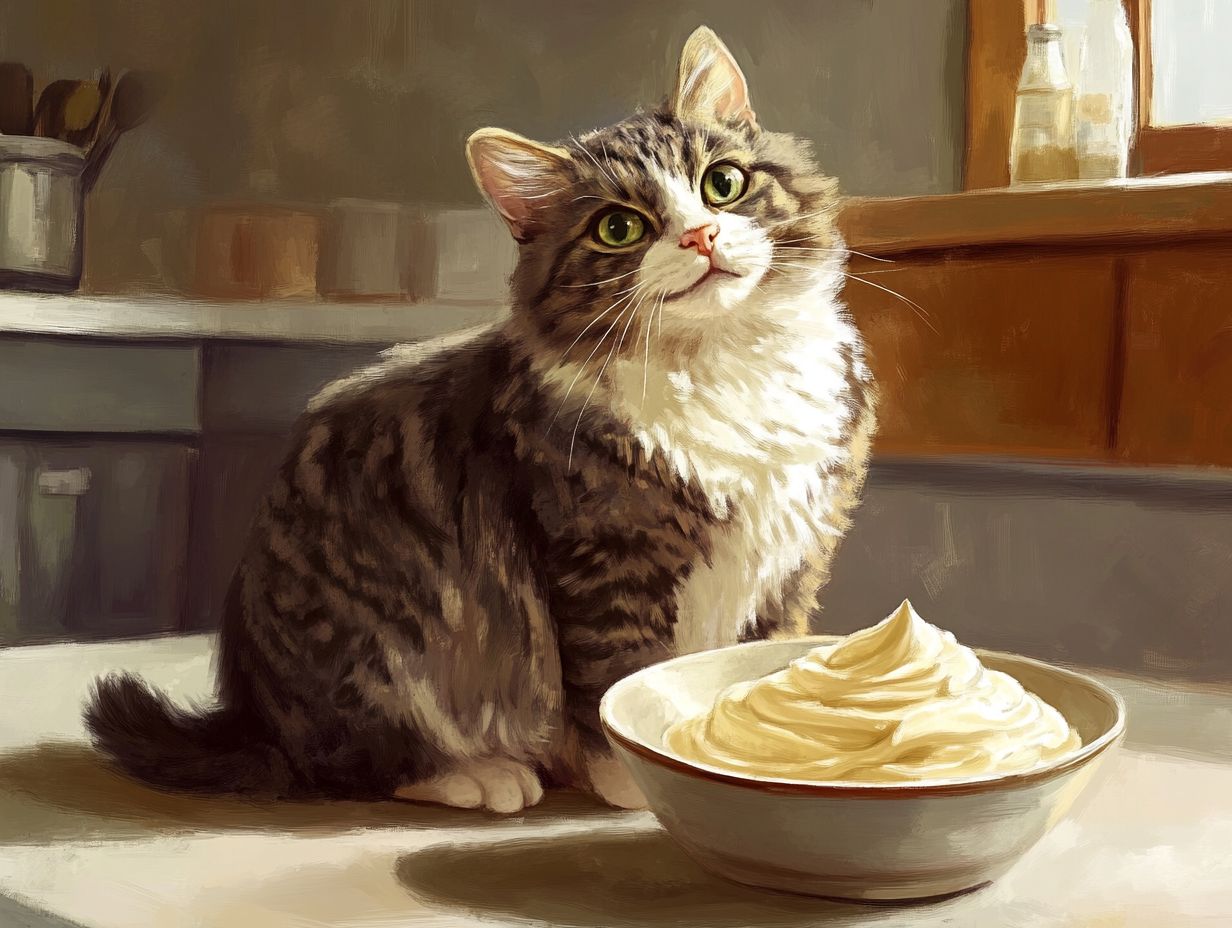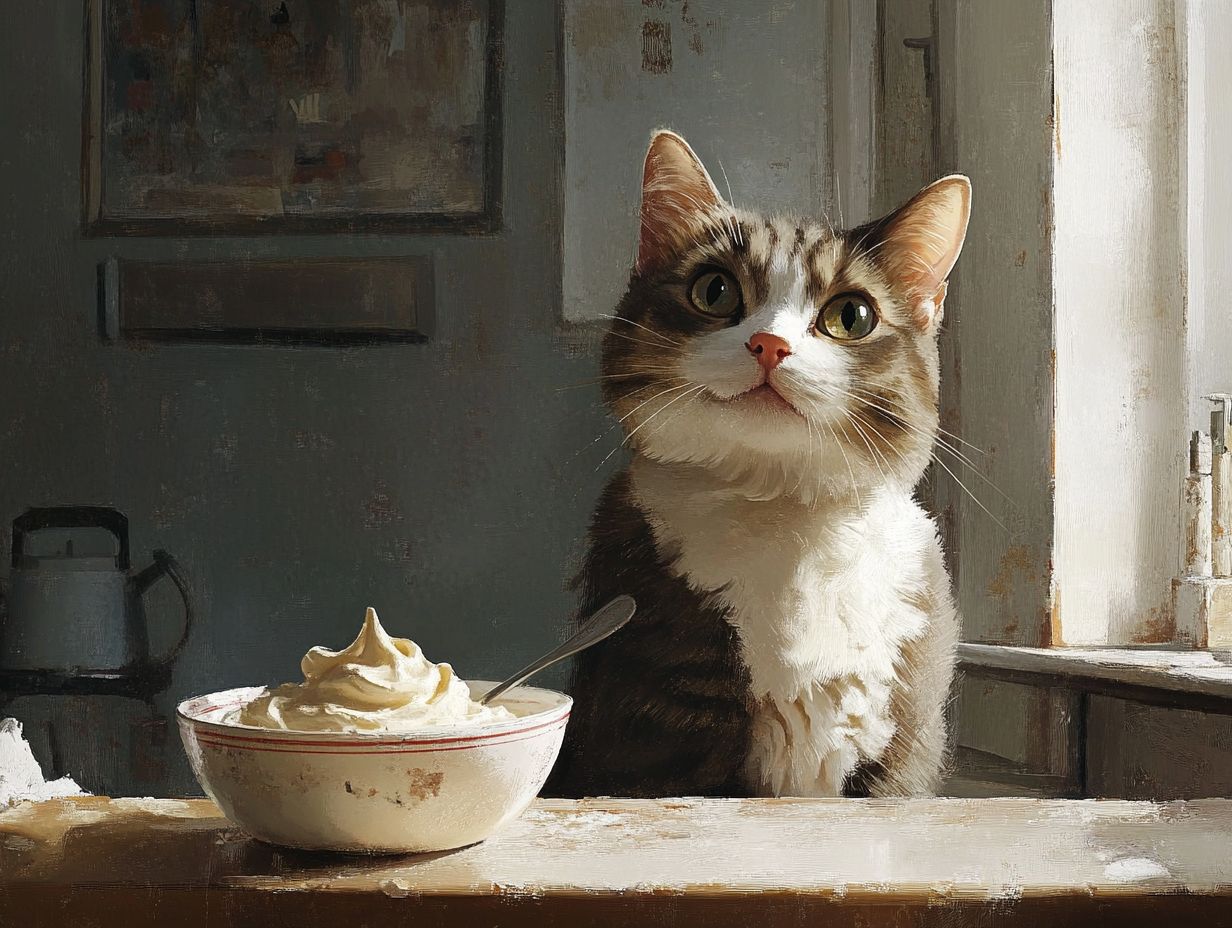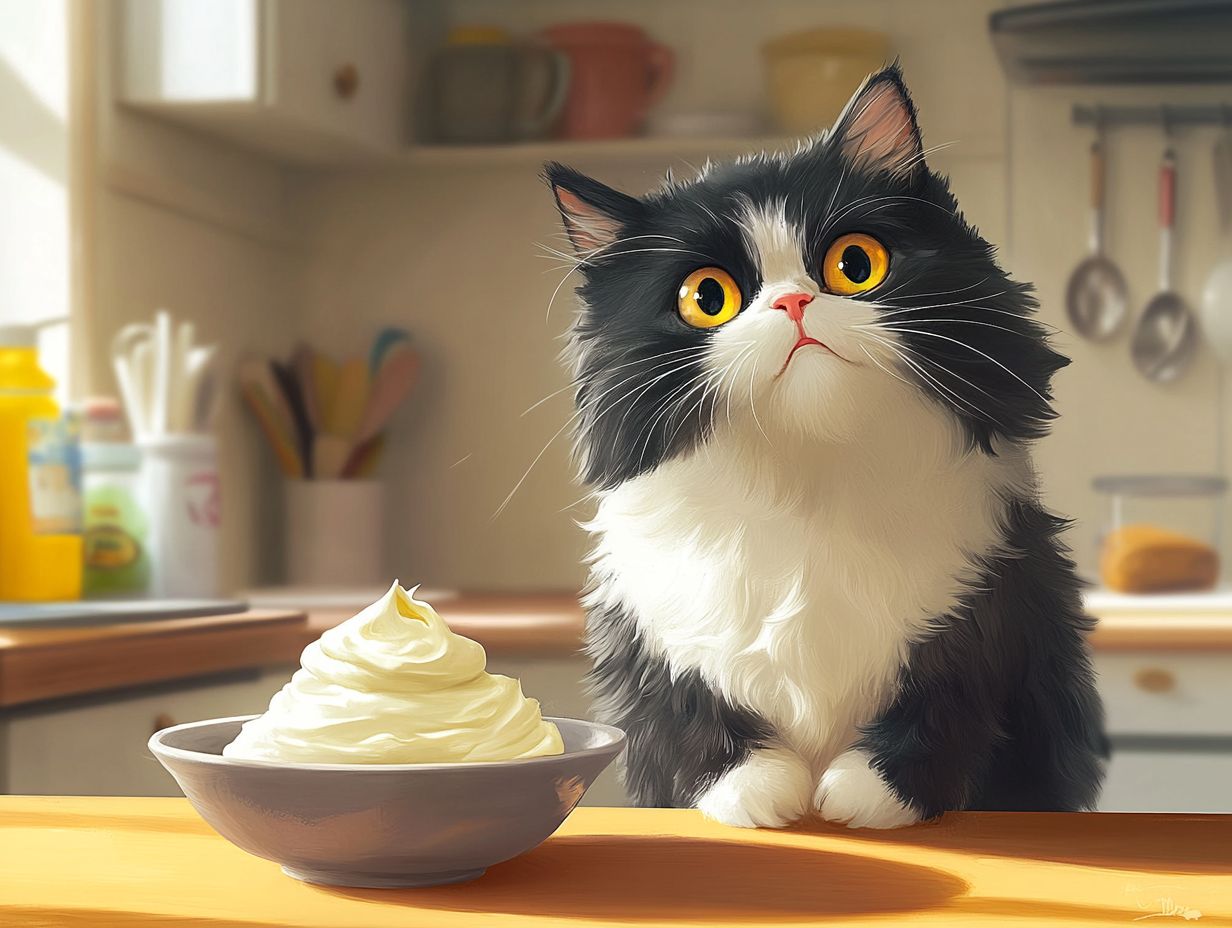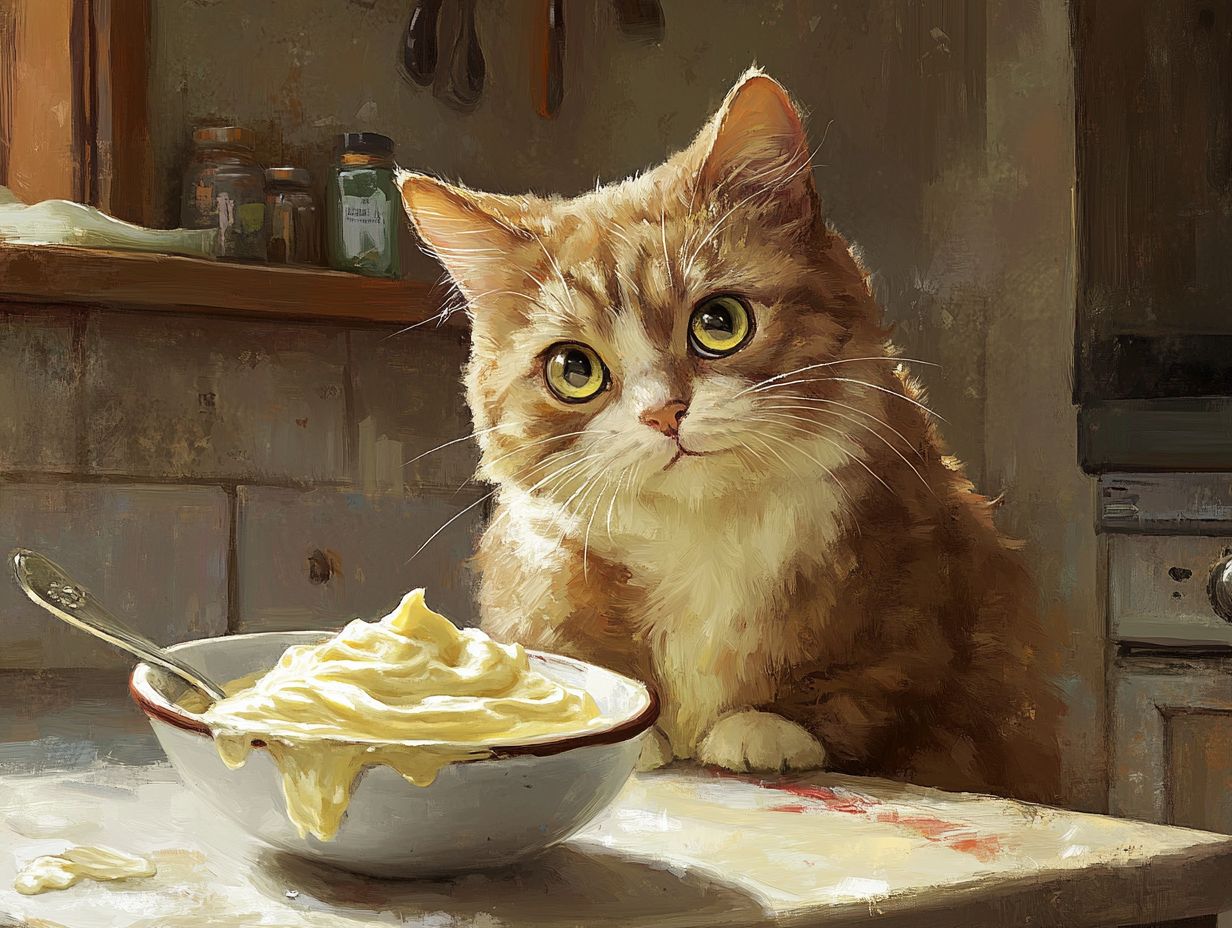Many cat owners wonder if mayonnaise is safe for their furry friends. This article will explore the dietary needs of cats, the potential risks and benefits of feeding them mayo, and safer alternatives.
Cats are fascinating creatures, and understanding their dietary needs is crucial for their health and happiness.
Can Cats Eat Mayo?
Cats can technically eat mayonnaise, but it is not advisable for them to do so. Mayonnaise is primarily composed of eggs and oil, so a small amount, such as a teaspoon, is unlikely to harm a cat immediately when offered as an occasional treat.
However, regular consumption of mayonnaise can lead to obesity and gastrointestinal issues, particularly due to its high fat content. In general, it is wise to exercise caution with this condiment and consult a veterinarian if there are any doubts.
Key Takeaways:

- Mayo is not suitable for cats as it lacks essential nutrients like protein and taurine.
- Feeding your cat mayo can lead to health risks such as digestive issues and pancreatitis.
- Consult a veterinarian if your cat shows signs of food allergies or intolerance, and consider safe alternatives like lean meats and commercial cat treats.
Understanding a Cat’s Diet
Understanding a cat’s diet is crucial for their overall health. As obligate carnivores, cats require specific nutrients to meet their energy needs.
A balanced diet rich in protein and essential fats is vital for preventing obesity and gastrointestinal issues, which are common in indoor cats. Familiarity with safe ingredients for cats can help reduce the risk of upset stomachs and other dietary problems.
Consulting with veterinarians can provide valuable guidance on proper dietary practices.
What Cats Need in Their Diet
Cats require a specialized diet that is rich in protein, fat, vitamins, and minerals to thrive and maintain good health. This nutritional balance is crucial for supporting their energy levels and overall vitality.
High-quality proteins sourced from meat are essential, as they provide the necessary amino acids for muscle development and repair. Along with proteins, essential fatty acids play a critical role in promoting healthy skin and a lustrous coat while also supporting cognitive functions.
Vitamins such as A, E, and various B vitamins, along with minerals like calcium and phosphorus, contribute to bone strength and immune system function. A well-rounded meal formulation ensures that these vital components are included, helping to prevent health issues and enhance the overall well-being of felines.
Potential Risks and Benefits

Pet owners should be aware of the risks and limited benefits of feeding mayonnaise to cats to ensure their pets remain healthy. Cats do not require mayonnaise in their diet, and while some cats may enjoy the texture, the high caloric and fat content makes it a significant contributor to obesity and weight gain in pets.
The rich ingredients can lead to digestive discomfort, with diarrhea and vomiting being the most common side effects. In very rare cases, a small lick might not pose a major problem, provided the ingredient list does not include harmful substances like garlic, onion, or lemon juice. Always consult your veterinarian for tailored advice.
Safe Alternatives to Mayo for Cats
Given the risks associated with feeding mayo, there are several healthy alternatives that are safe for cats and offer nutritional benefits without the high fat content.
Healthy Treat Options
Healthy treat options for cats include a variety of ingredients that support their dietary needs and overall well-being. Consider treats such as freeze-dried meat, which not only provides a burst of flavor but is also rich in protein, promoting muscle development.
If you want to treat your cat, consider offering them a small piece of cooked chicken instead of mayonnaise—no more than a teaspoon for a small cat.
When to Consult a Veterinarian
Recognizing when to seek veterinary advice is crucial for your cat’s health, especially if you notice behavioral changes such as decreased appetite, lethargy, or any digestive issues. Additionally, if you see skin irritations or unusual aggression, it is important to consult your veterinarian promptly.
Signs of Food Allergies or Intolerance

Signs of food allergies or intolerances in cats can vary, with common allergens including dairy, wheat, and certain proteins. Symptoms such as gastrointestinal issues like vomiting and diarrhea can lead to dehydration if not addressed. Skin irritations may present as scratching or redness, and symptoms can develop immediately or gradually over time, making it challenging to identify the trigger.
To help identify potential allergens, keeping a food diary is recommended. Track what your cat eats, note any symptoms, and bring this information to your vet to assist in making accurate diagnoses and dietary adjustments.
Frequently Asked Questions
Can cats eat mayo?
Yes, cats can eat mayo in small amounts, but it is not recommended as a part of their regular diet.
Is mayo safe for cats to eat?

In small amounts, mayo is generally safe for cats to eat. However, it should not be a regular part of their diet and should only be given as an occasional treat.
What are the potential risks of feeding cats mayo?
Mayo is high in fat and can cause digestive issues in cats, such as vomiting and diarrhea. It also contains ingredients that are not nutritionally beneficial for cats.
Can cats develop food allergies to mayo?
Yes, cats can develop allergies to mayo just like any other food. It is important to introduce new foods slowly and watch for any signs of an allergic reaction, such as itching, sneezing, or diarrhea.
Can mayo be toxic to cats?
No, mayo is not toxic to cats. However, it is important to avoid giving cats mayo that contains onion or garlic, as these ingredients can be toxic to cats.
What are some healthier alternatives to mayo for cats?
Cats should not consume mayo regularly, but some healthier alternatives for occasional treats include plain cooked chicken or fish, small amounts of plain yogurt, or pureed fruits and vegetables. Always consult with your veterinarian before introducing any new foods to your cat’s diet.
Conclusion
In summary, mayonnaise is not a suitable food for cats, and its potential risks outweigh any benefits. A balanced diet is essential for maintaining your cat’s health, so always opt for safe alternatives and consult your veterinarian for dietary guidance tailored to your feline friend.
Understanding the nutritional needs of cats is crucial for maintaining their health and well-being. We’ll explore various treats and ingredients, such as omega-3 fatty acids, pumpkin, and probiotics, while outlining safe practices for feeding your cat.
Others might prefer treats infused with omega-3 fatty acids from fish, known for their benefits in skin and coat health. Treats containing pumpkin can aid in digestive health due to their fiber content, while those with added probiotics help maintain balanced gut flora. Remember to keep treats to less than 10% of your cat’s daily calorie intake.
Other Considerations for a Cat’s Diet
- Kittens: Require a diet rich in protein and fat to support rapid growth.
- Adults: Need a balanced diet with adequate nutrients to maintain health.
- Senior Cats: Benefit from lower-calorie diets to help maintain a healthy weight.
Factors such as age, weight, health status, and activity level significantly influence a cat’s nutritional needs. If a cat has specific health issues, such as diabetes or kidney problems, dietary adjustments become even more critical. A veterinarian can provide valuable guidance on creating individualized nutritional plans that address these specific needs.